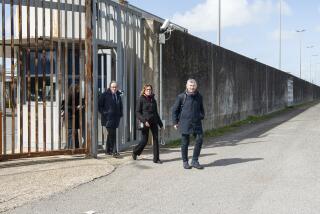Refugees in Camps: Prisoners for a 2nd Time
- Share via
Here are excerpts from “The Forgotten People: Vietnamese Refugees in Hong Kong.”
This is a report about people who have suffered greatly in their quest to find freedom. They have overcome numerous physical and mental hardships only to find themselves prisoners once again within the confines of the refugee camps in Hong Kong.
In 1982, the Hong Kong government introduced the closed camps as its official “humane deterrence” policy. The rationale behind this policy is to deter Vietnamese “boat people” from coming to Hong Kong. It specified that Vietnamese refugees who arrived after July 1, 1982, are to be put in one of the three closed camps and not permitted to leave the detention areas while remaining in Hong Kong. Specifically, upon their arrivals, boat people are given a written notice by the government informing them of their “choices.”
These notices, written in English, are often not understood by the refugees. Many social agencies, like OXFAM Hong Kong and Caritas, have claimed that the “humane deterrence” policy has not been successful in deterring the refugees from coming to Hong Kong. In fact, in the last two years, the number of Vietnamese boat people arriving has steadily increased. Moreover, 50% of the newly arrived had not heard of the closed-camp policy. Those who knew of the policy and chose to ignore it often did not realize the severe conditions of these camps.
Upon entering the closed camps, we can see many adults and children standing idly. Inside the barracks (also called huts), at any time, we would find people sitting or sleeping in their cramped cubicles. Adults and children are treated like prisoners with clocklike instincts. They are told when to eat, when to sleep and when to stay in their barracks in accordance with the curfew. They are not allowed to go beyond the boundaries set by wired fences. As a result, there is a pervasive sense of hopelessness and inferiority as they are being constantly watched by guards. Rejected by other nations for resettlement, many have lived in the camps for over five years.
Humanitarian concerns must override the self-interest of international politics when dealing with the refugee crisis. “Compassion fatigue” is often the response of those countries which felt that they have done more than their fair share of helping the refugees. We do not overlook the tremendous tasks these governments have done to resettle the Vietnamese refugees. However, we emphatically do not believe repatriation to be the panacea to the refugee crisis. We fear that Hong Kong and other western nations will eventually relinquish their moral responsibility to help those who share the same fundamental convictions of democratic values. It would be a grave injustice for the refugees who risk their life in escaping from their ancestral land if the free international community failed to hear their cry for help.
More to Read
Sign up for Essential California
The most important California stories and recommendations in your inbox every morning.
You may occasionally receive promotional content from the Los Angeles Times.













